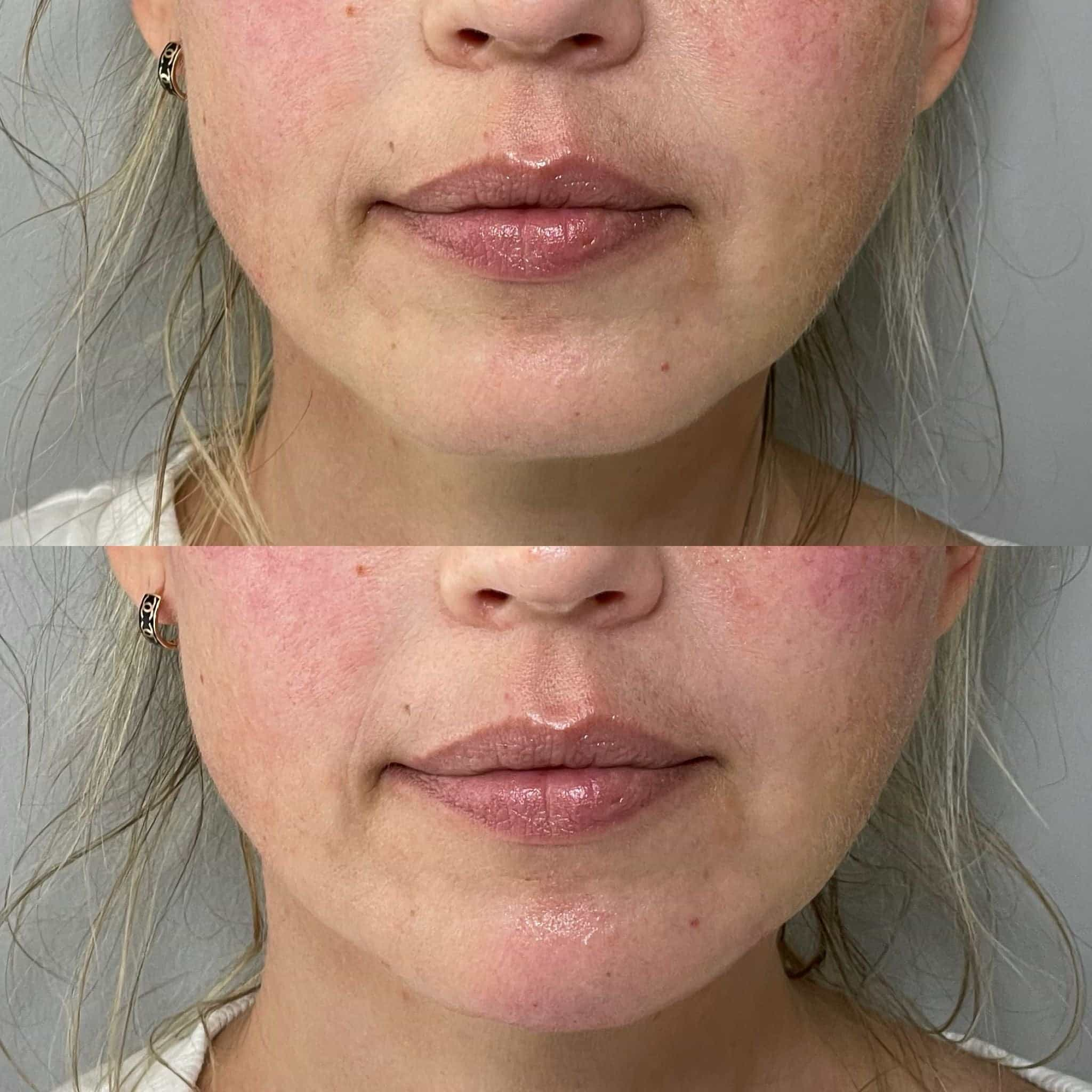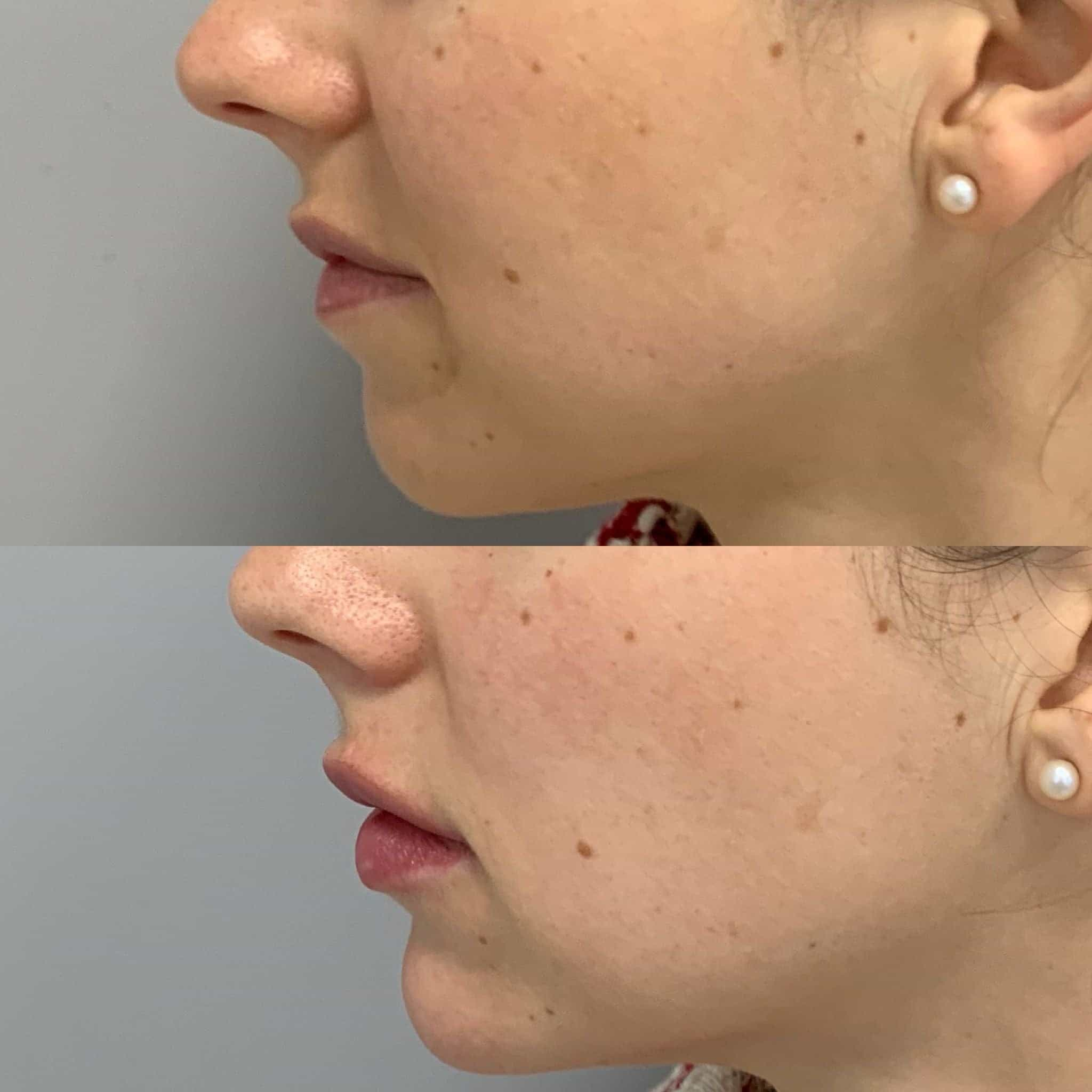Dermal Fillers
A dimpled chin, often a genetic feature, can sometimes be addressed through non-surgical treatments like dermal fillers. These injectable gels are composed of hyaluronic acid, a naturally occurring substance that helps maintain skin volume and elasticity.
How They Work
Dermal fillers work by adding volume to the area beneath the dimple. When injected strategically, they plump up the chin, smoothing out the appearance of the dimple. Hyaluronic acid attracts and retains water, further enhancing the fullness and creating a more contoured and even chin shape.
Types of Fillers for Dimples
Dermal fillers are a popular option for addressing a dimpled chin.
- Calcium hydroxylapatite (CaHA) fillers: These are known for their longevity, lasting up to 18 months. They provide volume and stimulate collagen production, leading to a more natural-looking result.
- Poly-L-lactic acid (PLLA): This type of filler gradually stimulates collagen growth over time, providing long-lasting results that can last for several years.
- Hyaluronic acid (HA) fillers: These are the most common type of dermal filler and offer a range of consistencies to suit different treatment needs. HA fillers are versatile for dimple correction and can be adjusted easily with follow-up treatments.
Pros and Cons
Like any medical procedure, dermal fillers come with both pros and cons that should be carefully considered.
On the positive side, they offer a non-surgical solution to address a dimpled chin, providing noticeable results with minimal downtime. The treatment is relatively quick and can be performed in a doctor’s office.
Dermal fillers are also reversible, meaning that if desired, the effects can be dissolved with an enzyme. Another benefit is the ability to customize the amount of filler used, allowing for subtle enhancements or more dramatic changes.

However, it’s important to be aware of potential drawbacks. Dermal fillers are not permanent and require repeat treatments to maintain results. There’s also a risk of side effects such as bruising, swelling, redness, and infection at the injection site. In some cases, allergic reactions can occur.
It is crucial to choose a qualified and experienced practitioner to minimize risks and ensure optimal outcomes.

Recovery and Results
Dermal fillers are a popular non-surgical option for addressing a dimpled chin. These injectable gels, primarily composed of hyaluronic acid, work by adding volume beneath the dimple, smoothing its appearance and creating a more contoured chin shape. Hyaluronic acid naturally attracts and retains water, further enhancing fullness.
Several types of dermal fillers are suitable for this treatment:
- Calcium hydroxylapatite (CaHA) fillers
- Poly-L-lactic acid (PLLA)
- Hyaluronic acid (HA) fillers
Like any medical procedure, dermal fillers have both advantages and disadvantages. The benefits include being a non-surgical option with noticeable results, minimal downtime, quick treatment time, reversibility, and the ability to customize the amount of filler used.
However, it’s important to be aware of potential drawbacks such as temporary results requiring repeat treatments, risks of bruising, swelling, redness, infection, and possible allergic reactions. Choosing a qualified and experienced practitioner is crucial for minimizing risks and achieving optimal outcomes.
Fat Grafting
For individuals seeking to address a dimpled chin without undergoing surgery, fat grafting presents an option. This procedure involves harvesting fat cells from another area of the body, typically the abdomen or thighs, and injecting them into the chin to fill in the dimple and smooth the contours.
Procedure Details
Fat grafting is a surgical procedure that uses fat cells harvested from one part of the body to augment another area. In the context of a dimpled chin, fat grafting involves taking fat cells from areas like the abdomen or thighs and injecting them into the chin.
The injected fat helps fill in the dimple, smoothing out its appearance and creating a more contoured chin shape. The process typically involves liposuction to extract the fat, followed by processing and injection into the desired area.
Potential Risks and Benefits
Like dermal fillers, fat grafting also has potential benefits and risks that should be carefully considered.
- Potential Benefits:
- Natural-Looking Results: Fat grafting uses the patient’s own tissue, making the results appear more natural compared to fillers.
- Long-Lasting Results: Fat cells have a higher likelihood of integrating and surviving in the recipient area, potentially leading to longer-lasting results than fillers.
- Dual Benefits: Fat grafting can address both volume deficiency and body contouring concerns simultaneously. The harvested fat can be used to augment other areas while smoothing the chin.
- Potential Risks:
- Surgical Procedure: Fat grafting is a surgical procedure, carrying inherent risks like infection, bleeding, and anesthesia complications.
- Fat Absorption: Not all injected fat survives. Some of the transferred fat may be absorbed by the body over time, requiring touch-up procedures.
- Lumpy Results: If the fat is not evenly distributed during injection, it can lead to a lumpy or uneven appearance.
It is essential to have a thorough consultation with a qualified plastic surgeon to discuss your expectations, potential risks, and determine if fat grafting is the right option for you.
Long-Term Outcomes
Fat grafting offers a surgical approach to address dimples on the chin. During this procedure, fat cells are harvested from another area of the body, typically the abdomen or thighs, through liposuction. These fat cells are then processed and injected into the chin to fill in the dimple.
While fat grafting can provide natural-looking results that last longer than dermal fillers, it is a surgical procedure with associated risks. Potential risks include infection, bleeding, anesthesia complications, fat absorption (where some of the transferred fat is reabsorbed by the body), and the possibility of lumpy or uneven results if the fat isn’t evenly distributed.
Patients considering fat grafting should consult with a qualified plastic surgeon to discuss their goals, assess their suitability for this procedure, and understand the potential risks and benefits involved.
Kybella Injections
Kybella injections are another non-surgical option for addressing a dimpled chin. Kybella is an injectable medication containing deoxycholic acid, a substance that naturally breaks down fat cells. When injected into the area beneath the chin dimple, Kybella destroys fat cells, gradually reducing the appearance of the dimple over a series of treatments.
Mechanism of Action
Kybella injections are another non-surgical option for addressing a dimpled chin.
Kybella is an injectable medication containing deoxycholic acid, a substance that naturally breaks down fat cells. When injected into the area beneath the chin dimple, Kybella destroys fat cells, gradually reducing the appearance of the dimple over a series of treatments.
- Mechanism of Action: Kybella works by targeting and dissolving fat cells in the submental region (under the chin). Deoxycholic acid, the active ingredient in Kybella, disrupts the cell membrane of fat cells, leading to their destruction. The body then naturally eliminates these destroyed cells.
- Treatment Process: Multiple Kybella injections are typically required to achieve desired results, spaced several weeks apart. During each treatment, a physician will inject Kybella into specific areas beneath the chin dimple.
Suitable Candidates
Kybella injections are a non-surgical option for addressing a dimpled chin by targeting and dissolving fat cells under the chin.
Suitable candidates for Kybella treatments generally include individuals who:
- Have mild to moderate submental fat (fat under the chin) that they desire to reduce.
- Are physically healthy and in good general health.
- Do not have any active skin infections or conditions in the treatment area.
- Have realistic expectations about the potential results of Kybella treatment.
Side Effects and Recovery
Kybella injections are a non-surgical treatment option for reducing fat under the chin, also known as submental fat. Kybella contains deoxycholic acid, a substance that naturally occurs in the body and helps break down fat cells.
When injected into the area beneath the chin dimple, Kybella destroys fat cells, gradually reducing the appearance of the dimple over a series of treatments. Multiple sessions are typically needed to achieve desired results.
Kybella is suitable for individuals who have mild to moderate submental fat and want a non-surgical approach to reduce it. It’s important to consult with a qualified healthcare professional to determine if you’re a suitable candidate and discuss potential side effects.
Common side effects of Kybella injections can include redness, swelling, bruising, pain, numbness, and tingling at the injection site. Most side effects are temporary and resolve on their own within a few days.
Achieve a smoother chin with Dr. Laura Geige’s expertise at It’s Me & You Clinic
- The Best THC Beverages For A Relaxing Evening At Home - December 6, 2025
- The Benefits Of CBD Gummy Edibles For Overall Wellness - December 3, 2025
- THC Seltzers:A New Trend In Social Drinking - December 2, 2025
